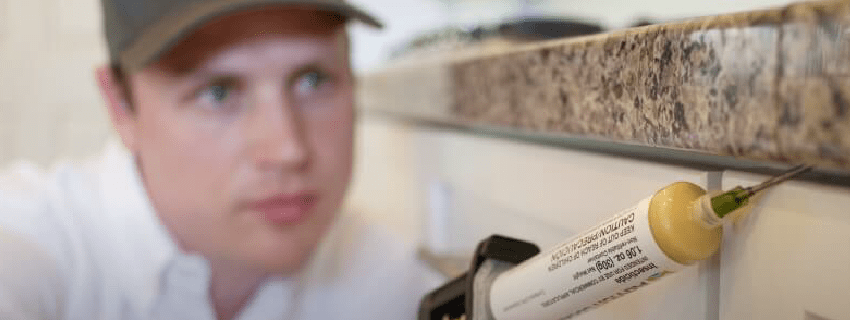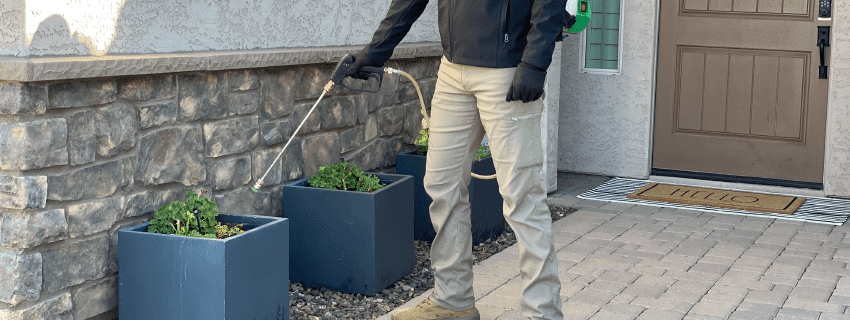Should You Do Your Own Pest Control in Phoenix?
When it comes to dealing with invasive home critters, DIY pest control is an option that many homeowners pursue. While we aren’t necessarily against taking matters into your own hands, knowing the situation and being realistic about the available DIY products will help you decide whether or not it’s worth it.
Once you have a serious infestation or pest problem, you’re going to need a professional to make sure your pest control is safe, effective long-term, and doesn’t damage your property. Thus, we’ve put together this handy guide for appraising the situation to help you decide when it’s appropriate to try some DIY home pest control tactics, and when you need to call in the pros. Read along to learn the best methods of dealing with the myriad of pests you might encounter at home.

5 Things to Consider about DIY Pest Control
The goal of any DIY project is to save money while doing a job that is acceptable relative to what professional services could render. For pest control or pest extermination services, here are some things that might tip the scales:
- Preventative or Existing Infestation?
One of the most effective forms of DIY pest control is keeping an eye out for potential home invaders before the problem gets out of hand. There are many environmentally friendly DIY products you can use to deter pests from nesting or getting into your lawn, walls, and dark spaces in a home. However, it still may be more prudent to use professional services to periodically treat your home in this manner.
Once there are significant pest problems at your residence, it is highly recommended to outsource your pest control. Reactive treatments to a problem will include thorough appraisals, advanced treatments (and ones that don’t have safe substitute DIY products), and plans for repeat treatments.
Recommended Reading: Chapter 2 – Common Household Pests in Phoenix
- Long-Term Goal?
This is another question that is difficult for DIY-ers, but not impossible to answer. If you are familiar with your pest and its solution, then deciding your plan of action for the short and long-term is manageable. However, if you are dealing with pests that show up due to seasonal or environmental triggers that you aren’t familiar with, you might be fighting an uphill battle. At a minimum, we recommend getting a consultation from a professional pest-control technician to determine if your plans make sense to someone with experience in the field.
- Equipment
A large portion of the perceived benefit of DIY pest control is cost-saving. However, by the time you familiarize yourself with the type of pest, what equipment is necessary to treat an infestation, and the frequency of it, you might be starting your own pest-control business. Unless you want to do that, it might be prudent to let the pros bring in the advanced treatments.
- Expense
Given that we’ve brought up cost-saving repeatedly, we might as well create its own section in this guide. You can certainly save some money on minor pest control with DIY implementations. For example, there are simple insecticides and sprayers for treating lawns that might be suitable. However, if you encounter a rat infestation in your home, your DIY attempts will likely just be taking your time to stave off the need for a true professional treatment.
- Peace of Mind
It is unlikely that you have spent enough time doing DIY pest control to have a comprehensive understanding of all the potential home invaders and the damage they do. This isn’t to insult your capabilities- some of the DIY work is very doable! However, a trained professional will know the most common pests in your area and be able to pinpoint the areas of concern at your residence with one visit. From there, they can formulate a plan of action for today and the future going forward. That sounds much easier to us!
When it comes down to it, most pest problems aren’t apparent to the untrained eye until it is too late. If you are familiar with a persistent problem and have had some professional consulting, then DIY solutions may be more feasible, but we will always err on the side of professional caution.
Recommended Reading: Chapter 1 – The Homeowners Complete Pest Control Guide

DIY Household Pest Control Tips and FAQs
While we continually push for professional services, we understand that some problems are feasibly solved if you implement resourceful DIY strategies. If you are wondering how to prevent infestation yourself, consider the following:
- Routine Exterior Inspections: A great way to save money on long-term pest problems is to prevent them from happening. A home inspection that consists of checking for warning signs such as chewed-on wood, damaged plants or lawns, and nests built-in nooks and crannies of your home is a great start.
- Routine Pesticide Application: Always make sure to read the labels of whatever pesticide or insecticide you are applying – whether it’s for indoor or outdoor use. Using eco-friendly and household-friendly products at a regular interval can prevent known pests in your area from settling on your property.
- Use “Green” Pest Control Treatment: With any DIY pest products, your main concerns are proper application and the harm they might have on you, your home, and the environment. If you are asking “can I spray my own house for bugs?”, then the answer will typically be answered on the label of the products available to you. However, it should be noted that these might not have the same efficacy as professional treatments, and often have a harsher footprint on your residence and the environment.
- Consult A Professional: Many pest control companies are happy to provide valuable insight via a free consultation or on their website. If nothing else, getting a second opinion before making aggressive moves could potentially save you time and money.
DIY pest control is mostly a practice that requires research, patience, and persistence. Even if you are proficient at these elements, there might be some pest intrusions that are best left to the professionals. Please exercise caution and consult your local pest control experts for most issues you encounter.
Recommended Reading: Chapter 6 – Pest Control FAQs: Can I Clean After Pest Control?
What are the Best Home Pest Control Products?
If you are taking matters into your own hands, we recommend using these products:
- Eco-Defense Home Pest Control Spray: Versatile, environmentally friendly, and applicable to indoor or outdoor pest control, Eco-Defense spray can help contain small pest problems on your property. It is quite safe for you and your property, and relatively odorless as well.
- Chapin 20000 Sprayer: For simple DIY home spray jobs, you still want to make sure you have cost-effective and safe products. This sprayer is easy to use, durable, and eco-friendly.
- Demon-WP: Another safe and effective home-use pesticide, Demon-WP is cost-effective and should last you through many months of inspection and application.
With any home-use or DIY pest control products, read the label before purchasing and follow all instructions while using them. For advanced pest control issues, we recommend consulting with a professional in addition to or in lieu of DIY work.

Recommended Reading: Chapter 5 – Finding the Right Professional Pest Control
Get a Free Consultation from Insectek
At Insectek, we have decades of experience in helping homeowners eliminate their pest invasions. If you are considering DIY pest control, we would love to talk with you about best practices, product recommendations, or supplemental pest control services.
Please reach out to us for a free consultation so that you can hear what our licensed professionals recommend for your property. One call could be the difference between a stressful pest invasion and a successful home defense.
Back to Top
